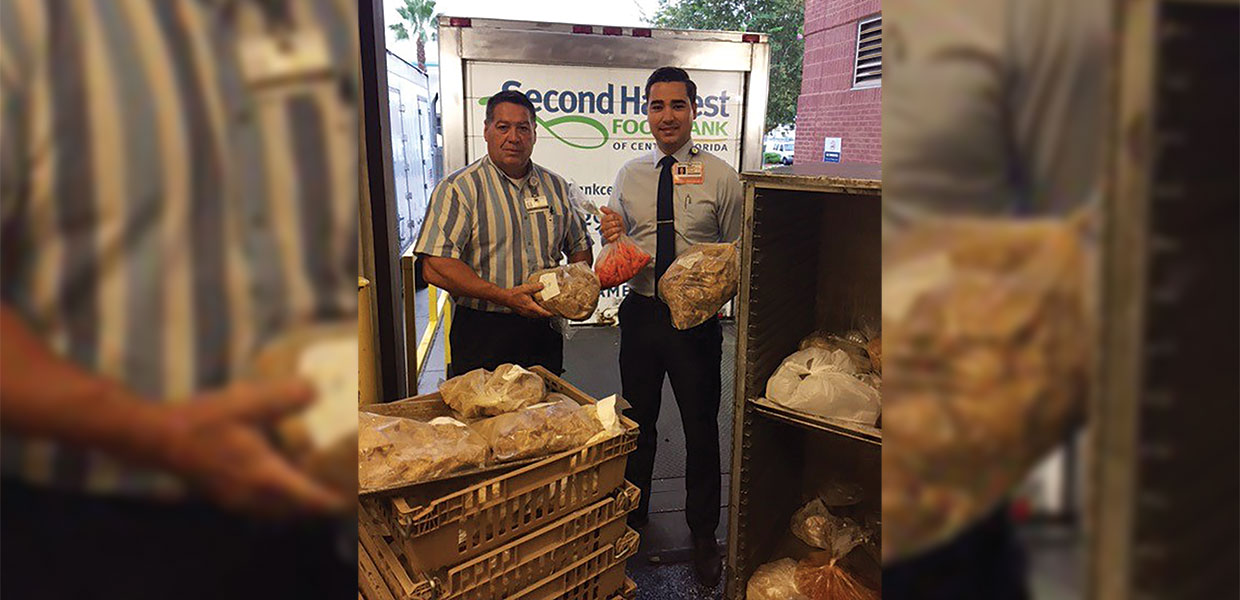
Recently, Florida Hospital (FH) Orlando began a partnership with Second Harvest Food Bank (SHFB) to launch a new initiative. Unused food that had previously been thrown away will now be packaged and stored for donation to SHFB, which will take these donations to local soup kitchens, churches, and other organizations.
This project received a big helping hand from an Adventist University of Health Sciences (ADU) master of healthcare administration (M.H.A.) graduate student, Fernando Blanco, Pharm.D. Blanco took a Capstone project graduation requirement and turned it into a passionate mission. When Blanco was informed of the planned partnership with SHFB, he was immediately drawn to its purpose, one that he saw as a natural fit with his work as a second-year pharmacy administration resident at Florida Hospital.
Reports that 70 percent of central Florida households have made the choice between buying food or paying mortgage or rent at least once during the previous year are devastating. From the perspective of one who is involved with providing patients often costly medications, Blanco imagined another difficult choice facing these disadvantaged households: the decision between buying food and paying for vital prescriptions. “It’s an unrealistic expectation for patients to adhere to their medicine regimen if they’re struggling to pay for food or rent.”
Getting the project off the ground was no easy effort. Blanco collaborated closely with Tennille Yates, a registered dietician from FH’s Nutritional Services team. SHFB needed an estimate on how much food they could expect from Florida Hospital each month. Blanco began the process by presenting information to the FH Nutritional Services team on the “how” and “why” of the initiative.
He covered nutrition, as well as relayed guidelines on what types of food could and could not be sent for donation. Next he began his waste assessment phase by placing receptacles in the hospital’s cafeterias and kitchens for potential food donations to be sorted by the workers there. At the end of each day, he collected these and weighed them. After a month he calculated the average amount of food for SHFB to expect each month — a staggering 2,000 pounds of food.
He presented his results to the Nutritional Services team as well, which allowed them to evaluate where they were wasting resources the most, and enabling them to be more efficient with food production. The members of SHFB were surprised by the thoroughness of Blanco’s work, noting it was a first from one of their partners. As a bonus, the foods primarily being donated from Florida Hospital were expected to be more nutritious, consisting primarily of high quality proteins, vegetables, and fruits, as opposed to typical food donations of processed meals and canned foods.
Blanco was excited about the future of this project, mentioning the community impact this partnership will have, and how it ties strongly to FH’s and ADU’s population health initiatives. Re-purposing leftover food that would have ended up in landfills decreases monetary and environmental costs for the community, while providing health benefits for impoverished families.
The goal is to spread this program to all Florida Hospital campuses, and the east Orlando campus is already on board, having received a visit from Blanco to get the process started. Overall, the project has been successful, with more than 10,000 meals donated since March 2017.
Currently, Blanco has completed his residency with Florida Hospital and started a new role as the pharmacy business and operations manager. He is in the final stages of earning his M.H.A. degree, with an expected completion date of December 18, 2017. But still, his community work continues. His dedicated, detailed work impressed SHFB, and they invited him to present his educational materials and findings to other community leaders, including members of Orlando Health, paving the way for others to follow.
Blanco’s exemplary work represents the qualities that Adventist University of Health Sciences envisions for all its graduates. Students leaving the institution are trained to become healthcare leaders who display innovative thinking, and a drive to serve their community through superior, compassionate care.
Adventist University of Health Sciences | October 2017



Comments are closed.